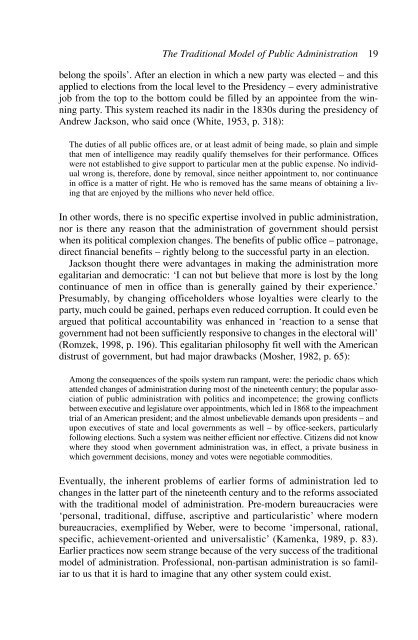Public Management and Administration - Owen E.hughes
Public Management and Administration - Owen E.hughes
Public Management and Administration - Owen E.hughes
Create successful ePaper yourself
Turn your PDF publications into a flip-book with our unique Google optimized e-Paper software.
The Traditional Model of <strong>Public</strong> <strong>Administration</strong> 19<br />
belong the spoils’. After an election in which a new party was elected – <strong>and</strong> this<br />
applied to elections from the local level to the Presidency – every administrative<br />
job from the top to the bottom could be filled by an appointee from the winning<br />
party. This system reached its nadir in the 1830s during the presidency of<br />
Andrew Jackson, who said once (White, 1953, p. 318):<br />
The duties of all public offices are, or at least admit of being made, so plain <strong>and</strong> simple<br />
that men of intelligence may readily qualify themselves for their performance. Offices<br />
were not established to give support to particular men at the public expense. No individual<br />
wrong is, therefore, done by removal, since neither appointment to, nor continuance<br />
in office is a matter of right. He who is removed has the same means of obtaining a living<br />
that are enjoyed by the millions who never held office.<br />
In other words, there is no specific expertise involved in public administration,<br />
nor is there any reason that the administration of government should persist<br />
when its political complexion changes. The benefits of public office – patronage,<br />
direct financial benefits – rightly belong to the successful party in an election.<br />
Jackson thought there were advantages in making the administration more<br />
egalitarian <strong>and</strong> democratic: ‘I can not but believe that more is lost by the long<br />
continuance of men in office than is generally gained by their experience.’<br />
Presumably, by changing officeholders whose loyalties were clearly to the<br />
party, much could be gained, perhaps even reduced corruption. It could even be<br />
argued that political accountability was enhanced in ‘reaction to a sense that<br />
government had not been sufficiently responsive to changes in the electoral will’<br />
(Romzek, 1998, p. 196). This egalitarian philosophy fit well with the American<br />
distrust of government, but had major drawbacks (Mosher, 1982, p. 65):<br />
Among the consequences of the spoils system run rampant, were: the periodic chaos which<br />
attended changes of administration during most of the nineteenth century; the popular association<br />
of public administration with politics <strong>and</strong> incompetence; the growing conflicts<br />
between executive <strong>and</strong> legislature over appointments, which led in 1868 to the impeachment<br />
trial of an American president; <strong>and</strong> the almost unbelievable dem<strong>and</strong>s upon presidents – <strong>and</strong><br />
upon executives of state <strong>and</strong> local governments as well – by office-seekers, particularly<br />
following elections. Such a system was neither efficient nor effective. Citizens did not know<br />
where they stood when government administration was, in effect, a private business in<br />
which government decisions, money <strong>and</strong> votes were negotiable commodities.<br />
Eventually, the inherent problems of earlier forms of administration led to<br />
changes in the latter part of the nineteenth century <strong>and</strong> to the reforms associated<br />
with the traditional model of administration. Pre-modern bureaucracies were<br />
‘personal, traditional, diffuse, ascriptive <strong>and</strong> particularistic’ where modern<br />
bureaucracies, exemplified by Weber, were to become ‘impersonal, rational,<br />
specific, achievement-oriented <strong>and</strong> universalistic’ (Kamenka, 1989, p. 83).<br />
Earlier practices now seem strange because of the very success of the traditional<br />
model of administration. Professional, non-partisan administration is so familiar<br />
to us that it is hard to imagine that any other system could exist.











